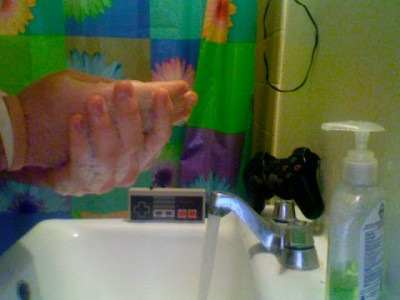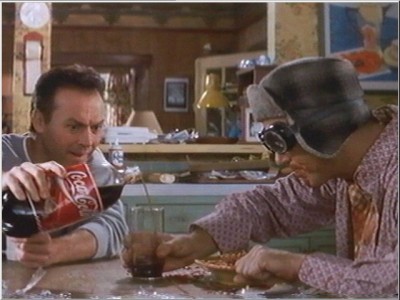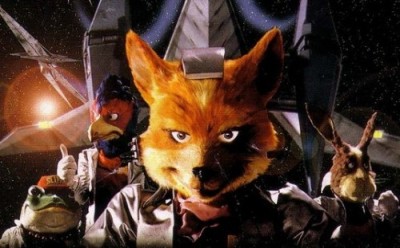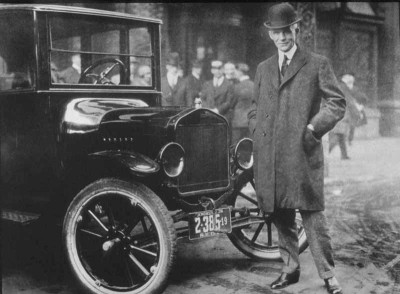
Obsessive Compulsive Disorder (OCD) is diagnosed through a number of symptoms and pathologies, but the most predominant and well known characteristics are repetitive thoughts, feelings, and behaviors that never successfully subdue a need or anxiety. The classic example is the irrational and insatiable washing of hands despite the hands being cleansed.
3D Dot Hero is a game that has a poorly rendered character taking his wooden sword on a journey to save a kingdom by going through six elementally based dungeons. Luckily you have a small fairy companion and a legendary sword at your disposal. Wikipedia has the plot listed as:
The game follows a hero on a quest to rid the Dotnia Kingdom of a dark plague caused by the forces of evil in order to restore peace to the land. Legend tells of an evil king known as the Dark King Onyx who brought tragedy and darkness to the kingdom by stealing six magical orbs. However a hero rose up against the Dark King and with his legendary sword as well as the power of the orbs, he sealed Onyx away within another orb. However, the forces of evil rose again as the Dark Bishop Fuelle stole the orb and threw the Kingdom of Dotnia into a state of chaos once more. The game’s main protagonist is the grandchild of the brave hero who  sealed away the Dark King and thus is entrusted with the responsibility to save the land.
sealed away the Dark King and thus is entrusted with the responsibility to save the land.
Now if you are like me, and think that this sounds a bit familiar… it’s because it is…. this is almost completely identical to the Legend of Zelda, which is a series often praised and criticized for having similar game play, level design, characters, and basically is completely identical other than graphical upgrades and some minor changes. Not only is this a rip off of another game, it is a rip off of a game that has been replicating itself for nearly twenty years. Now I am not saying that 3D Dot Hero is the mentally disabled clone like in Multiplicity; I am sure it’s a fun game, but something about this worries me. Another game that seems to be following this pattern is Quantum Theory. This game seems be a doppelganger of Gears of War, and I don’t think it is really ashamed of that. This is not really a new pattern, most of the classic games we all love have repeated themselves with only small differences and have been cloned countless times.
Here is a list of, which follow a similar pattern:
- The Legend of Zelda Series
- Castlevania Series
- Halo Series
- Call of Duty Series
- Mr and Mrs. Pac-Man
- Super Mario Series
- Kirby Series
- God of War Series
- Grand Theft Auto Series
- Guitar Hero/Rock Band
- Ratchet and Clank
If you get my drift after this very short list, almost all these incredibly popular games suffer from the self-replication syndrome. So what has this got to do with OCD? Well my argument is that games that clone each other or self replicate are the sinks, and we are the OCD patients who continue to wash our hands over and over and over and over again. What happens is that it is no longer about the fulfillment of playing the game, but about the ritual of going through the process itself. It is almost like an addiction in nature. When we first started playing games, they were new adventures that had our imaginations running wild with excitement. New genres and game mechanics were invented with every coming year and us gamers could roll with the punches, and adapt and learn. Today as we are already addicts, it is no longer about the pleasure and the imagination, but instead about the ritual of going through the same pattern. It is accepted that there are a limited amount of genres, that we have capped out. We no longer want that feeling of excitement, instead we are only concerned with getting the job done, by going through the same old games over and over.
Now if your first reaction after reading this is “If it ain’t broke, don’t fix it” I ask you to think about this motto at a deeper and more profound level which looks at the effect this has on our industry. These companies that create big budget AAA games generally are able to hire the best developers, artists, programmers, directors, etc. These are the incredibly creative and amazing innovators who come up with the first title in a series that change the industry, but as time wears on they are stuck making the same game over and over because of gamer demand. Why is it that Bungie over the last five years has desperately been trying to escape the grasp of Microsoft? The answer I believe is that they are sick of having to make the same game over and over again. They want to move on and use their creativity and innovation in a new way. This is the same reason that J.K. Rowling doesn’t just write Harry Potter books forever even though God knows they would sell.

Ribbet Rib Rib Rib Do a barrel roll!
This is not the fault of the game companies (well not entirely); this is our fault. We, the gamers, are the ones who have an insatiable appetite for the same experience, and we punish game companies harshly if they vary from our routine. The first example I will cite is Super Mario Sunshine, which many would say is the worst of the 3D Adventures Mario has gone on. The problem with this is the majority of the gameplay was changed radically from previous titles. For example, you now had a waterpack/gun as your primary weapon, and our goal was to clean the environment, and not solely to save the princess. Same can be said for Luigi’s Mansion. Essentially, Nintendo took the soap away from our sink and we panicked. Soon that panic turned to rage, and the game, console (GameCube), and industry suffered. If this game had been called “Super Eddy Sunshine” and had been the exact same game minus Mario, it would have been more than likely praised as one of the coolest and most exciting IPs of the year. Instead it was disseminated into obscurity as “the failed Mario game.” Is it any surprise that the next two Mario titles were so stuffed full of nostalgia that it was almost criminal? Nintendo learned their lesson. Gaming is the only technology field where innovation is actually frowned upon because of a serious threat of low sales.
Another example is Starfox Adventures for the Nintendo Gamecube. As soon as Fox stepped out of that ship, every gamer began to sweat with withdrawal symptoms. We began to panic like someone had locked the bathroom door after we just shook hands with a very sweaty King Hippo. We, as gamers, freak out at the signs of change and ultimately this hurts us, developers, and industry as a whole.
So what does this have to do with 3D Dot Hero and Quantum Theory? Well these games are dangerous indicators of what may be to come. It is one thing for an individual company to remake their own game in sequel form, or HD update it, but when other companies begin to shamelessly rip off nostalgia and game play from previous titles and gamers are excited about it……well then we are in for trouble. Where this leads is for game makers to begin thinking backwards rather than forwards. Companies are going to begin thinking, how can I repackage an already socially approved formula, rather than invent my own. Sadly to say, with rising development costs, and low sales of new and innovative IPs, this seems to be the direction we are going.
It is for this reason that there really hasn’t been that much of a major change in gameplay since the don of the 3D age. We are still doing the same things in FPS that we were doing in Quake or Doom fifteen years ago. Same goes for platformers, RPGs, RTS, and racing titles. For goodness sake, Mirror’s Edge, which was praised for being incredibly innovative was really just a FPS with no guns…except you did have guns after all. As if the developers started to do something cool and innovative, but then the management in fear of retaliation choked the leash back, and had to have some insurance guns in the game, just in case. Point being, these companies can only make slight changes in order to not get the retaliation of the gamers wallet. One company I would really like to praise is Team Ninja for pushing Metroid in a direction that is incredibly new and innovative, but still keep a healthy touch of familiarity. Hopefully for their sake, hardcore Metroid purists will be able to look past their own anxiety around change and accept something new. For hypothetical reasons, lets say this game flops, and is plagued with issues. Well I guess I would be happy that it tried something new and failed, than the team dogmatically recreated an identical title and succeeded. And who knows, even if it did flop, maybe it would inspire other developers to learn from their mistakes and do it right. Imagine if this kind of innovation was applied to all old franchises? If Mario, Zelda, GTA, and Ratchet and Clank would be pushed any way game developers wanted, without having to adhere to the OCD of gamers. Finally, I would like to point out a Henry Ford quote
choked the leash back, and had to have some insurance guns in the game, just in case. Point being, these companies can only make slight changes in order to not get the retaliation of the gamers wallet. One company I would really like to praise is Team Ninja for pushing Metroid in a direction that is incredibly new and innovative, but still keep a healthy touch of familiarity. Hopefully for their sake, hardcore Metroid purists will be able to look past their own anxiety around change and accept something new. For hypothetical reasons, lets say this game flops, and is plagued with issues. Well I guess I would be happy that it tried something new and failed, than the team dogmatically recreated an identical title and succeeded. And who knows, even if it did flop, maybe it would inspire other developers to learn from their mistakes and do it right. Imagine if this kind of innovation was applied to all old franchises? If Mario, Zelda, GTA, and Ratchet and Clank would be pushed any way game developers wanted, without having to adhere to the OCD of gamers. Finally, I would like to point out a Henry Ford quote
“If I had asked people what they wanted, they would have said a faster horse!”
The comic below, that comes from underwhelmed.com, and is the best summary of what I believe is the irony of this issue.
‘
The opinions expressed in this article are solely those of Kipp Pietrantonio.

First Kipp, LoZ has been replicating itself for 23 years, not almost 20. Second it isn’t The Adventures of Zelda, it is The Legend of Zelda Series. Mirror’s Edge is a First Person Platformer, there are very few games in that genre but it is a FPP. You should also remember that Starfox Adventures was an entirely different game called Dinosaur Planet, and then Rare changed it to work as a Starfox game, it had its faults because the controls weren’t as solid as they could have been when you were out of your Arwing or Landmaster.
If it isn’t broke don’t fix it, but you can add to it to continue to make it awesome. There needs to be some familiarity to things so we know how to play them, but by adding an awesome story and some new gameplay changes, the game can be better than its predecessors. If a Dev sticks to the same formula then the game it stale, but the one thing Zelda has is a different mostly non-connecting story and different weapons in each game, that makes the game better, unlike other games that act the same way with a continuing story that gets wore with every sequel released (MW2 and Halo come to mind). Some games we don’t like to change because those games should only be in that genre and follow that style of play; Contra, Sonic, and Castlevania (Lords of Shadow will see if it can do a good 3D Castlevania game finally). Some games just work the way they are and cannot be changed, but there are games that can evolve because their Universe allows them to expand, others on the other hand are doomed to stay with the same tried and true formula. There still needs to be new genres and games with original ideas created, and then every other game tries to copy that innovative title, and history repeats itself.
Gameplay doesn’t make or break a game. I’d be perfectly satisfied to play clones of Baldur’s Gate until I die provided each clone had a new set of characters, quests, and a new universe to explore. Same with the Diablo series and many others.
We can complain about TLoZ being the same as it was before, but it’s still good and as Keck said; new storylines, puzzles, enemies, and items make it seem fresh. As for 3D Dot Heroes, it’s an intentional homage to TLoZ and other adventure games of olde so it’s kind of unfair to call it out.
I don’t feel a strong need for games to be radically different in terms of gameplay for the same reason I don’t think that new films should disregard what’s been proven to work. Because then the creators are just being ‘different’ to be ‘different.’
And as for remakes and ports, I think those are important to preserve the classics. Also, for financial reasons, I’m delighted that Lunar 1’s enhanced PSP remake will be out soon. Because the Lunar games and in fact almost all PS1 RPG’s are ludicrously expensive and hard to find.
Remakes and ports of older games are also important, because it gets people who haven’t played the games a chance to play the games, primarily the younger generation who didn’t get to play older games, collections also serve this same purpose.
You’re actually answering it with more of what he says. He doesn’t say more of the same is bad, he’s saying no new stuff is bad and he’s right.
What i do think is that most things get to a point that they don’t innovate anymore and that they just start morphing around and turning into new stuff. I don’t say video games are at that point, but mainstream games seem to. The indie scene’s a little less money attached and that leaves them free to develop without the inconveniences of fanbases and amount of copies sold expectancies and publishers. I think that it’s beginning to show that like with movies, as costs go higher, creators take less risks and the mainstream games start to lose more and more ground to indie games as far as artistic quality goes.
As far as fan backlash goes, i guess that’s inevitable. I’m the first to say that Fallout 3 should be called Fallout Lame-ass-spin-off and if that hurts the industry, i don’t care. I suppose that’s not the most correct attittude, but being that defensive’s a defining thing of gamers.
Hey Keck, thanks for the edit on Zelda, that was a typo.
No problem, I like to see that things are as correct as possible, I guess you could say it is my OCD. I hate misinformation, and it can be detrimental if there is too much misinformation. Good thing there aren’t that many people here right now, or that you didn’t post this on GoNintendo, that could have been worse result.
I kinda see what you are saying, but at the same time, I also disagree with it. Sometimes, having more of the same is a good thing… as long as it is being released at the right time (I think this is why Darksiders didn’t feel all that great).
But for every ‘same old thing’ game that we get, we usually also get a unique and innovative title to go with it.
I play games for new experiences, and I am not even close to being tired with all of the different stuff we have right now.
I just beat Phoenix Wright on wiiware, and I freaking loved it! That is what ports can do… give people a new opportunity to try a game they didn’t get to experience before.
I take more of an issue with franchises that seem to not be bringing anything new to the table after their 5th or 6th sequal. LoZ comes quickly to mind (the 3d versions at least). Take a cue from Final Fantasy… bring a completely new feel with every entry.
Fans DID hate FF XII and seems like XIII with no towns and no grinding is getting a lot of fan hate too.
I’m just saying that it is something different every time
What i mean is that, like Kipp says, whenever a series deviates from the path all the fans go at them like the religious cult we are. Final Fantasy XII was a long stretch for the series, and everybody hated it (i liked it btw)…
From what I hear, XIII has some grinding in it, just not nearly the amount that was in previous games. I wish XII was more like XII, but with the setting and story that it has now, just my opinion.
I’m a huge fan of the series and I loved FFXII. The battle system was essentially ATB under the veil of ‘real-time battles.’
I liked ff12, but it didn’t really feel like final fantasy to me. Felt more like a single player version of WoW.